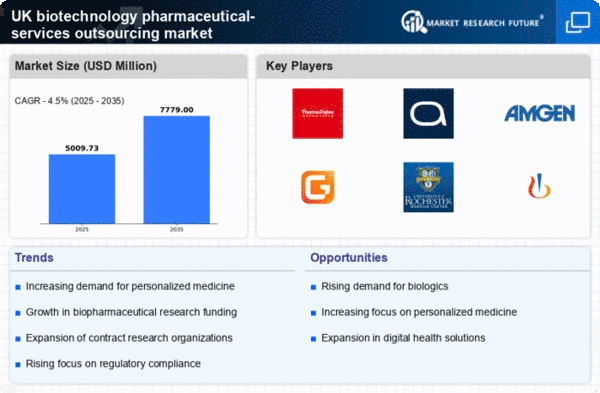The biotechnology pharmaceutical-services-outsources market in the UK is characterized by a dynamic competitive landscape, driven by innovation, strategic partnerships, and a focus on digital transformation. Key players such as GSK (GB), Roche (CH), and Thermo Fisher Scientific (US) are actively shaping the market through their distinct operational strategies. GSK (GB) emphasizes its commitment to research and development, particularly in immunology and oncology, while Roche (CH) focuses on personalized healthcare solutions, leveraging its extensive data analytics capabilities. Thermo Fisher Scientific (US) positions itself as a leader in providing comprehensive laboratory services, which enhances its competitive edge in the outsourcing segment. Collectively, these strategies foster a competitive environment that prioritizes innovation and responsiveness to market demands.
In terms of business tactics, companies are increasingly localizing manufacturing and optimizing supply chains to enhance efficiency and reduce costs. The market structure appears moderately fragmented, with several key players exerting substantial influence. This fragmentation allows for a diverse range of services and products, yet the collective strength of major companies like GSK (GB) and Roche (CH) suggests a competitive dynamic that is both collaborative and competitive, as these firms often engage in partnerships to leverage each other's strengths.
In October 2025, GSK (GB) announced a strategic partnership with a leading AI firm to enhance its drug discovery processes. This collaboration aims to integrate advanced machine learning algorithms into GSK's research framework, potentially accelerating the development of new therapies. The strategic importance of this move lies in GSK's recognition of AI as a critical tool for innovation, which may significantly reduce time-to-market for new drugs and improve patient outcomes.
In September 2025, Roche (CH) launched a new digital platform designed to streamline clinical trial management. This platform is expected to enhance data collection and analysis, thereby improving the efficiency of clinical trials. The strategic significance of this initiative is profound, as it positions Roche at the forefront of digital transformation in clinical research, potentially leading to faster approvals and a more robust pipeline of innovative therapies.
In August 2025, Thermo Fisher Scientific (US) expanded its manufacturing capabilities in the UK by investing $50M in a new facility dedicated to biopharmaceutical production. This expansion is strategically important as it not only increases production capacity but also aligns with the growing demand for biopharmaceuticals in the region. By enhancing its local manufacturing footprint, Thermo Fisher aims to improve supply chain reliability and responsiveness to client needs.
As of November 2025, current competitive trends in the biotechnology pharmaceutical-services-outsources market are increasingly defined by digitalization, sustainability, and the integration of AI technologies. Strategic alliances are becoming more prevalent, as companies recognize the value of collaboration in navigating complex market challenges. Looking ahead, competitive differentiation is likely to evolve from traditional price-based competition to a focus on innovation, technological advancement, and supply chain reliability. This shift underscores the importance of agility and responsiveness in a rapidly changing market landscape.

















